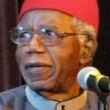Glory: A Novel
(Libby/OverDrive eAudiobook)
Available Platforms
Description
More Details
Excerpt
Similar Titles From NoveList
Similar Authors From NoveList
Published Reviews
Booklist Review
From the award-winning author of We Need New Names (2013), Glory centers on a fictional country, Jidada, inhabited and ruled by anthropomorphic animals. Jidada's leader is Old Horse, a tyrant publicly praised by his subjects but privately bemoaned as failing and past his prime. Reigning over a country suffering from a treacherous economy, blackouts, and a seething underbelly of discontent, Old Horse's downfall is imminent and inevitable. A power vacuum ensues, giving rise to Tuvy, also a horse and vice president in Old Horse's regime. Although Tuvy promises a new Jidada, he is patriarchal, misogynist, and ruthless. Seeds of rebellion once again disrupt Jidada, and as Tuvy's Defenders--dogs charged with protecting Tuvy's regime--defect, refusing their charge to safeguard the tyrant, an opening is created for revolution and true liberation. Will the downtrodden citizen-animals of Jidada have the strength and resilience to seize a new opportunity to create equity and freedom for all? Bulawayo's second novel mirrors events in Zimbabwe's history, Robert Mugabe's decades-long reign, and the colonial and post-colonial influences of the West and China in Africa.
Publisher's Weekly Review
Bulawayo (We Need New Names) grapples with political upheaval in a fictional African country with this fierce and playful work featuring animal characters. Jidada, a former colony, gained its independence during the Liberation War and has since been ruled by the ruthless "Father of the Nation," a horse who has maintained his 40-year reign through rigged elections and the persecution of "Dissidents." As such, when he is ousted and succeeded by vice president Tuvy Delight Shasha, another "old horse," many Jidadans become hopeful, believing the latest revolution will bring prosperity to their nation. But when an increasingly totalitarian Tuvy begins to misuse the country's wealth and implement corrupt policies to safeguard his power, Jidadans start to wonder whether his government will be just like his predecessor's, or worse. The consequences of the new government's abuses reverberate in stories of Jidadan families, like that of Destiny Lozikeyi Khumalo, a young goat whose reunion with her mother after a 10-year exile prompts a revelation that will irrevocably alter the course of both Destiny's and Jidada's fate. Throughout, Bulawayo keenly displays the perspectives of political players and the civilians who bear the brunt of their violence. With satire that feels necessary and urgent, Bulawayo brings clarity to a murky political morass. Agent: Jin Auh, Wylie Agency. (Mar.)
Library Journal Review
In this political fable, 2013 Booker Prize nominee Bulawayo (We Need New Names) exposes years of corrupt autocratic rule in the fictional African country Jidada. The Father of the Nation, Old Horse, actually an aging horse, is married to glamorous Dr. Sweet Mother, a donkey with ambitions of her own. Protected by the Defenders, a brutal army of dogs, these animals symbolize Zimbabwe's former president Robert Mugabe and his wife Grace but could be interpreted as any regime that refuses to step aside when voted out. In a wry nod to the previous U.S. administration, Bulawayo writes of a contentious #freefairncredibleelection that will "make Jidada great again" and she refers to China's pillaging of Jidada's abundant natural resources as an all-you-can-eat buffet. The novel covers decades of history but unfortunately lacks a cohesive plot, so that midway through, when the author introduces Destiny Khumalo, an exiled goat returning to her birthplace, it's difficult to become invested in her story. VERDICT The anthropomorphic motif has been effectively employed in adult literature like Animal Farm or Watership Down but feels distracting here, creating an emotional distance between the reader and the four-legged characters. Perhaps through living, breathing human beings, Bulawayo could have better amplified the grim reality of those living under oppressive governments and the courage required to rise up in glory.--Sally Bissell
Kirkus Book Review
A nation of animals is stirred to revolt in the face of decadeslong dictatorial rule. Bulawayo's second novel--following We Need New Names (2013)--opens with the decline of Old Horse, the longtime authoritarian leader of the African nation of Jidada who is, literally, an old horse. His regime is out of touch when it isn't actively corrupt--a (pig) crony priest emptily sings his praises, his (canine) generals support his hard-line attitude, and his (donkey) wife turns a deaf ear to protesters. When Old Horse dies, the menagerie of citizens is cautiously hopeful for reform--cats, pigs, and other disgruntled creatures tweet out their fury, echoing contemporary themes of frustration with right-wing, egotistical leaders. (The unnamed U.S. president is a "Tweeting Baboon.") Of course, the new horse is the same as the old horse: Tuvius, aka Tuvy, arrives with plenty of rhetoric about a "New Dispensation," but he quickly proves himself greedy, egotistical, and belligerent toward all who cross him. A counterweight comes in the form of Destiny, a goat and writer raised on memories of the old regime's violence. Bulawayo's use of animals gives the story a bit of quirkiness, and she writes sinuous prose rich with repetition and intensifiers that conjure a mood of an epic folktale. But the characters are so fundamentally human in behavior and action--tweeting, jet-setting, slaughtering--that the setup scarcely qualifies as an allegory. And for a novel of such breadth, its arc is straightforward; Tuvy is so cartoonishly dim, Destiny so straightforwardly heroic, and Jidadans' rhetoric so well-worn ("What do we have to do in order for our bodies, our lives, our dreams, our futures, to finally matter?") that the conclusions feel overly familiar despite its offbeat conceit. A lyrical if rote tale of dominance and resistance. Copyright (c) Kirkus Reviews, used with permission.
Booklist Reviews
From the award-winning author of We Need New Names (2013), Glory centers on a fictional country, Jidada, inhabited and ruled by anthropomorphic animals. Jidada's leader is Old Horse, a tyrant publicly praised by his subjects but privately bemoaned as failing and past his prime. Reigning over a country suffering from a treacherous economy, blackouts, and a seething underbelly of discontent, Old Horse's downfall is imminent and inevitable. A power vacuum ensues, giving rise to Tuvy, also a horse and vice president in Old Horse's regime. Although Tuvy promises a new Jidada, he is patriarchal, misogynist, and ruthless. Seeds of rebellion once again disrupt Jidada, and as Tuvy's Defenders—dogs charged with protecting Tuvy's regime—defect, refusing their charge to safeguard the tyrant, an opening is created for revolution and true liberation. Will the downtrodden citizen-animals of Jidada have the strength and resilience to seize a new opportunity to create equity and freedom for all? Bulawayo's second novel mirrors events in Zimbabwe's history, Robert Mugabe's decades-long reign, and the colonial and post-colonial influences of the West and China in Africa. Copyright 2022 Booklist Reviews.
Library Journal Reviews
The long wait is over after the 2013 publication of the multi-award-winning, Man Booker Prize finalist We Need New Names, which led to Bulawayo's being given National Book Award 5 Under 35 honors. In her new book, Old Horse, the oppressive leader of the fictional country of Jidada, finally plummets from grace, and the country's animal kingdom seeks liberation in a story that aims to show us that power can be crushed as long as those who counter it remain smart, imaginative, and relentlessly optimistic. Meanwhile, Destiny returns from exile to bear witness to the country's makeover and to record the role women have long played in Jidada's survival.
Copyright 2021 Library Journal.Library Journal Reviews
In this political fable, 2013 Booker Prize nominee Bulawayo (We Need NewNames) exposes years of corrupt autocratic rule in the fictional African country Jidada. The Father of the Nation, Old Horse, actually an aging horse, is married to glamorous Dr. Sweet Mother, a donkey with ambitions of her own. Protected by the Defenders, a brutal army of dogs, these animals symbolize Zimbabwe's former president Robert Mugabe and his wife Grace but could be interpreted as any regime that refuses to step aside when voted out. In a wry nod to the previous U.S. administration, Bulawayo writes of a contentious #freefairncredibleelection that will "make Jidada great again" and she refers to China's pillaging of Jidada's abundant natural resources as an all-you-can-eat buffet. The novel covers decades of history but unfortunately lacks a cohesive plot, so that midway through, when the author introduces Destiny Khumalo, an exiled goat returning to her birthplace, it's difficult to become invested in her story. VERDICT The anthropomorphic motif has been effectively employed in adult literature like Animal Farm or Watership Down but feels distracting here, creating an emotional distance between the reader and the four-legged characters. Perhaps through living, breathing human beings, Bulawayo could have better amplified the grim reality of those living under oppressive governments and the courage required to rise up in glory.—Sally Bissell
Copyright 2022 Library Journal.Publishers Weekly Reviews
Bulawayo (We Need New Names) grapples with political upheaval in a fictional African country with this fierce and playful work featuring animal characters. Jidada, a former colony, gained its independence during the Liberation War and has since been ruled by the ruthless "Father of the Nation," a horse who has maintained his 40-year reign through rigged elections and the persecution of "Dissidents." As such, when he is ousted and succeeded by vice president Tuvy Delight Shasha, another "old horse," many Jidadans become hopeful, believing the latest revolution will bring prosperity to their nation. But when an increasingly totalitarian Tuvy begins to misuse the country's wealth and implement corrupt policies to safeguard his power, Jidadans start to wonder whether his government will be just like his predecessor's, or worse. The consequences of the new government's abuses reverberate in stories of Jidadan families, like that of Destiny Lozikeyi Khumalo, a young goat whose reunion with her mother after a 10-year exile prompts a revelation that will irrevocably alter the course of both Destiny's and Jidada's fate. Throughout, Bulawayo keenly displays the perspectives of political players and the civilians who bear the brunt of their violence. With satire that feels necessary and urgent, Bulawayo brings clarity to a murky political morass. Agent: Jin Auh, Wylie Agency. (Mar.)
Copyright 2022 Publishers Weekly.Reviews from GoodReads
Citations
Bulawayo, N., & Chung, C. (2022). Glory: A Novel (Unabridged). Books on Tape.
Chicago / Turabian - Author Date Citation, 17th Edition (style guide)Bulawayo, NoViolet and Chipo Chung. 2022. Glory: A Novel. Books on Tape.
Chicago / Turabian - Humanities (Notes and Bibliography) Citation, 17th Edition (style guide)Bulawayo, NoViolet and Chipo Chung. Glory: A Novel Books on Tape, 2022.
Harvard Citation (style guide)Bulawayo, N. and Chung, C. (2022). Glory: a novel. Unabridged Books on Tape.
MLA Citation, 9th Edition (style guide)Bulawayo, NoViolet, and Chipo Chung. Glory: A Novel Unabridged, Books on Tape, 2022.
Copy Details
| Collection | Owned | Available | Number of Holds |
|---|---|---|---|
| Libby | 2 | 1 | 1 |
































